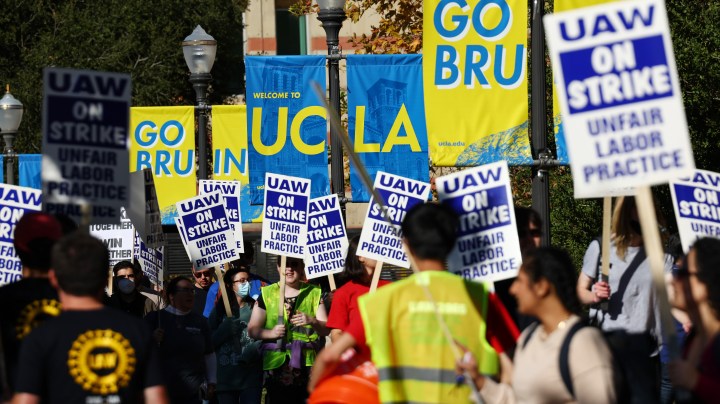
12,000 striking academic workers reach tentative agreement with University of California
12,000 striking academic workers reach tentative agreement with University of California

After being on strike for more than two weeks, some of the academic workers in the University of California system have reached a tentative agreement with their employer.
Twelve thousand postdoctoral scholars and researchers will get salary increases, more paid family leave and free public transit passes. But other student workers in the UC system — including teaching assistants and graduate student instructors — have yet to reach an agreement, and all of them will remain on strike for the time being.
Union leaders have called it the largest strike in the country’s history of higher ed, and the ramifications will reach far beyond California.
Neal Sweeney is president of the union of those postdoctoral scholars and academic researchers at the University of California. He was up until about 2 a.m. Tuesday morning after negotiating the agreement with the school system.
“I feel tired right now,” he said, laughing.
The contract is historic, Sweeney said, for providing salary increases for postdocs of at least 20% — the largest he’s seen. Academic workers around the country have reached out to ask how the union did it.
“I feel like I’m part of something larger than myself,” he said. “Something that’s, like, gonna be really significant moving forward.”
The contract also has new protections for workers with disabilities and climate-related provisions, such as discounts on ebikes. These could give ideas to student workers outside California.
“We’re talking about so many students across the country, so many individuals who are in similar positions,” said Sean Edmund Rogers, who studies labor relations as a professor at the University of Rhode Island.
The current university model in the U.S. isn’t sustainable for today’s student workers, he said. “Think about how many people don’t make it through a graduate program because they can’t make ends meet. And so you lose that person from the profession, and potentially you lose discoveries and innovation and creativity.”
Even if student workers don’t decide to unionize, other university systems could make changes based on what happens in California.
“One of the effects that unions have are what we think of as spillover effects,” said Tim Cain, a professor of higher education at the University of Georgia. “Other organizations can look to what’s coming out of the unionization effort at another campus and change their own conditions.”
And that could help them better compete for workers.
There’s a lot happening in the world. Through it all, Marketplace is here for you.
You rely on Marketplace to break down the world’s events and tell you how it affects you in a fact-based, approachable way. We rely on your financial support to keep making that possible.
Your donation today powers the independent journalism that you rely on. For just $5/month, you can help sustain Marketplace so we can keep reporting on the things that matter to you.

















